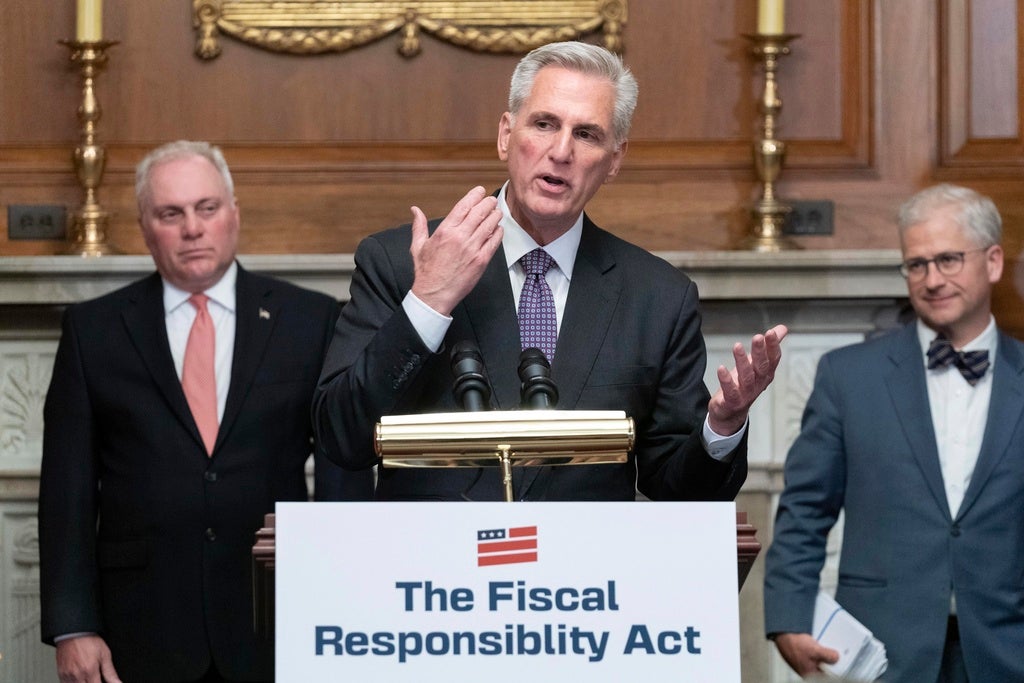
WASHINGTON (AP) — Veering away from a default crisis, the House overwhelmingly approved a debt ceiling and budget cuts package, sending the deal that President Joe Biden and Speaker Kevin McCarthy negotiated to the Senate for swift passage in a matter of days, before a fast-approaching deadline.
The hard-fought compromise pleased few, but lawmakers assessed it was better than the alternative — a devastating economic upheaval if Congress failed to act. Tensions ran high as hard-right Republicans refused the deal, but Biden and McCarthy assembled a bipartisan coalition to push to passage on a robust 314-117 vote late Wednesday.
“We did pretty dang good,” McCarthy, R-Calif., said afterward.
Amid deep discontent from Republicans who said the spending restrictions did not go far enough, McCarthy said it is only a “first step.”
Biden, watching the tally from Colorado Springs where Thursday he is scheduled to deliver the commencement address at the U.S. Air Force Academy, phoned McCarthy and the other congressional leaders after the vote. In a statement, he called the outcome “good news for the American people and the American economy.”
Washington is rushing after a long slog of debate to wrap up work on the package to ensure the government can keep paying its bills, and prevent financial upheaval at home and abroad. Next Monday is when the Treasury has said the U.S. would run short of money and risk a dangerous default.
Biden had been calling lawmakers directly to shore up backing. McCarthy worked to sell skeptical fellow Republicans, even fending off challenges to his leadership.
A similar bipartisan effort from Democrats and Republicans will be needed in the Senate to overcome objections.
Overall, the 99-page bill would make some inroads in curbing the nation’s deficits as Republicans demanded, without rolling back Trump-era tax breaks as Biden wanted. To pass it, Biden and McCarthy counted on support from the political center, a rarity in divided Washington.
A compromise, the package restricts spending for the next two years, suspends the debt ceiling into January 2025 and changes some policies, including imposing new work requirements for older Americans receiving food aid and greenlighting an Appalachian natural gas line that many Democrats oppose. It bolsters funds for defense and veterans, and guts new money for Internal Revenue Service agents.
Raising the nation’s debt limit, now $31 trillion, ensures Treasury can borrow to pay already incurred U.S. debts.
Top GOP deal negotiator Rep. Garret Graves of Louisiana said Republicans were fighting for budget cuts after the past years of extra spending, first during the COVID-19 crisis and later with Biden’s Inflation Reduction Act, with its historic investment to fight climate change paid for with revenues elsewhere.
But Republican Rep. Chip Roy, a member of the Freedom Caucus helping to lead the opposition, said, “My beef is that you cut a deal that shouldn’t have been cut.”
For weeks negotiators labored late into the night to strike the deal with the White House, and for days McCarthy has worked to build support among skeptics. At one point, aides wheeled in pizza at the Capitol the night before the vote as he walked Republicans through the details, fielded questions and encouraged them not to lose sight of the bill’s budget savings.
The remainder of this article is available in its entirety at CBN